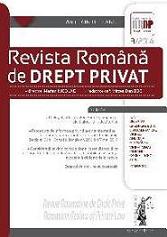Sisteme sau teorii folosite de către stat în soluţionarea litigiilor privind lăcaşurile de cult
Systems or theories used by the state in resolving disputes concerning places of worship
Author(s): Ioan-Daniel ChişSubject(s): Law, Constitution, Jurisprudence
Published by: Universul Juridic
Keywords: religious buildings; claim; takeover; places of worship; State neutrality; autonomy of religions; disputes; trust; schism of religions; religious doctrine; church; switching to another religion; Decree no. 126/1990.
Summary/Abstract: Switching to another cult or schism within religions is an issue concerning the religious doctrine, but, inevitably, it has effects on the church property. Such property is claimed by each faction; therefore, a dispute arises concerning this property. The State is required to provide an instrument for resolving such disputes, but it is also required to abstain from interfering in matters concerning the religious doctrine. Over time, the doctrine and the courts, in particular the Anglo-American ones, have developed several methods that provide assistance in resolving these disputes, without being able to ignore State neutrality. The ECHR, in the case Miro Ubovs and others vs. Latvia, provides an approach, in its turn, starting from State neutrality, which is the only one reasonable, actually. Taking over the places of worship from the Greek-Catholic church following its dissolution in 1948 and its believers moving to Orthodox church, gave the Romanian courts, including the Constitutional Court, the opportunity to rule on this matter, after 1989, and it is a matter resolved inconsistently, in the absence of a legislative solution.
Journal: Revista Română de Drept Privat
- Issue Year: 2014
- Issue No: 03
- Page Range: 99-133
- Page Count: 35
- Language: Romanian
- Content File-PDF

